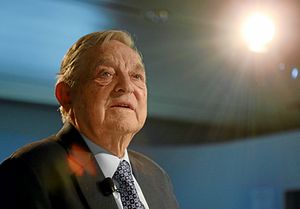On January 24, billionaire George Soros delivered a public speech at the World Economic Forum (WEF) in Davos, Switzerland. He sharply criticized Chinese President Xi Jinping’s rule and urged the international community to jointly crack down on Chinese high-tech companies. His sensational remarks immediately made the Chinese foreign ministry push back.
The 88-year-old Hungarian-American investor and philanthropist, who has donated more than $32 billion to his philanthropic agency, Open Society Foundations, obviously aimed to take full advantage of the highly visible WEF meeting to issue a warning on China’s threat to the world.
In his speech, he straightforwardly pointed out that China has posed a “mortal threat to open societies” because the nation has combined repressive regime with IT monopolies. He said:
China isn’t the only authoritarian regime in the world, but it’s undoubtedly the wealthiest, strongest, and most developed in machine learning and artificial intelligence. This makes Xi Jinping the most dangerous opponent of those who believe in the concept of open society. But Xi isn’t alone. Authoritarian regimes are proliferating all over the world and if they succeed, they will become totalitarian… The reality is that we are in a Cold War that threatens to turn into a hot one.
Soros particularly singled out China’s ongoing social credit system, which he found “frightening and abhorrent.” He predicted that the system will “subordinate the fate of the individual to the interests of the one-party state in ways unprecedented in history.”
On Xi’s signature Belt and Road Initiative (BRI), Soros had some harsh criticism, too. He said the BRI was “designed to promote the interests of China, not the interests of the recipient countries” and many of BRI’s projected “proved to be uneconomic.”
Soros thus urged the world — the United States in particular — to put forward a “far more sophisticated, detailed, and practical” policy toward China. He also proposed some of his own detailed suggestions, including cracking down on China’s telecom giants ZTE and Huawei so that the two companies can’t dominate the 5G market.
At the regular press briefing on January 25, Chinese foreign ministry spokesperson Hua Chunying immediately condemned Soros without mentioning his name. Hua claimed that Soros had called “white black” and confused “right and wrong,” but she didn’t specify exactly what Soros got wrong in his speech.
Hua said: “In today’s world, it is very easy to tell who is opening the door and paving roads and who is closing the door and building walls.”
“We hope that the relevant people on the U.S. side can set right their attitude, broaden their horizon, and view China’s development in an objective, reasonable, and correct way,” she added.
In contrast to Hua’s rebuke, Mike Forsythe, a New York Times reporter who had lived in China for years, thought Soros’ address was “the only thing” people need to read from the WEF.
Forsythe said on his Twitter account: “Soros lays out the threat to free societies posed by China under Xi. Elites have so much money tied to China that you rarely get this level of honesty.”

































